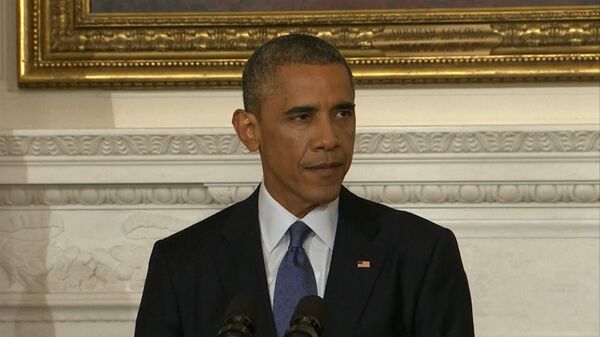WASHINGTON, September 29 (RIA Novosti) - As the United States forms closer regional allies in the fight against the Islamic State (IS), it must be careful that its Gulf state allies, in particular, are not manipulating intelligence to guide a US response to sectarian threats, according to Dr. Frederic Wehrey, senior associate at the Middle East program of the Carnegie Endowment for International Peace.
"There's [a] threat…that if they want us to do something, the intelligence they pass us, can certainly lead us down a certain path," Wehrey said at a Monday conference held by the Center for Strategic International Studies.
"I would argue for...being mindful about the way our intelligence collaboration with these states can be used in certain ways," Wehrey continued without naming any specific US partners in the Persian Gulf.
The expert warned that because of the various national and sectarian interests that are present in the anti-IS coalition, the United States could be drawn into its allies" conflicts.
"We really need to be careful about the way our partners are, sort of, conflating the threats," Wehrey said, noting that there must be "greater sensitivity to those types of issues."
The United States is currently leading an international coalition, aimed to fight the threat of the IS extremist group and other terrorist organizations, operating in the Middle East.
The IS, also known as the Islamic State of Iraq and Greater Syria (ISIS) and the Islamic State of Iraq and the Levant (ISIL), has been fighting against the Syrian government since 2012. In June 2014, IS militants launched an offensive in northern and western Iraq and declared the establishment of a caliphate on the territories under its control, forcing thousands of people, mostly religious minorities, to flee.
In August, the United States authorized limited airstrikes against IS positions in Iraq.
On September 10, US President Barack Obama unveiled his strategy to defeat the IS, which stipulated forming an international coalition, providing equipment and training to Kurdish and Iraqi forces, as well as Syria's moderate opposition, and conducting airstrikes against IS positions in Syria, while simultaneously continuing airstrikes in Iraq.
The United Kingdom, Denmark, France and Belgium have joined the United States in conducting airstrikes against the IS in Iraq.
The anti-IS coalition currently includes Bahrain, Kuwait, Oman, Qatar, Saudi Arabia, and the United Arab Emirates, as well as Egypt, Iraq, Jordan and Lebanon.



